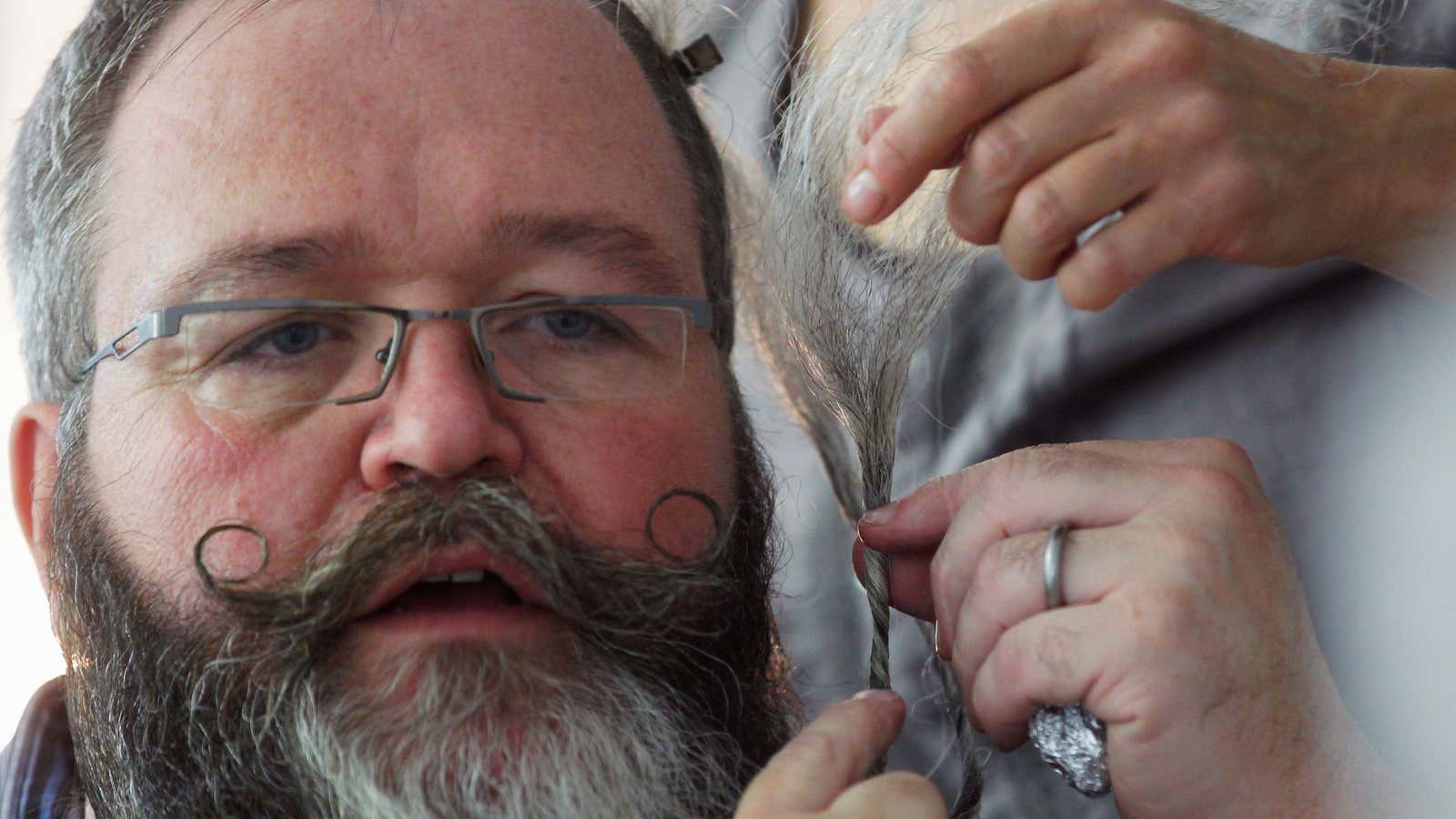Those who believe growing a beard is a personal fashion choice need to reconsider. The bristly facial hair of men is, in fact, the physical embodiment of deep ethical and aesthetic considerations. Henry Pratt, philosophy professor at Marist College in Poughkeepsie, New York, wrote a detailed analysis of such philosophical conundrums in his aptly titled paper, “To Beard or Not to Beard: Ethical and Aesthetic Obligations and Facial Hair.”
In this paper, presented at the January 2019 eastern division meeting of the American Philosophical Association in New York, Pratt considers the premise set out by Saint Anselm of Canterbury, an 11th century philosopher. Anselm writes:
Not having a beard is not dishonorable for a man who is not yet supposed to have a beard, but once he ought to have a beard, it is unbecoming for him not to have one. In the same way, not having justice is not a defect in a nature that is not obligated to have justice, but it is disgraceful for a nature that ought to have it.

Pratt, who has his own striking facial hair, notes that, while some beards are aesthetically displeasing, many others indeed “add aesthetic value to the world.” His examples of such beauticious beards include those of Abraham Lincoln, Jesus, and Santa Claus (though Pratt does acknowledge that any assessment of beard aesthetics will be subjective). And, as philosopher Howard Press argued in his 1969 paper “Aesthetic Obligation,” that which has beauty also has moral worth.“Hence, if we have obligations to promote moral values, we have obligations to make the world better aesthetically,” writes Pratt. “We ought to respect the beautiful and create it where possible: if one can grow beautiful facial hair, one should, as it has moral worth. And given that one ought to be authentic to oneself, if that self (and the life story accompanies it) produces facial hair, then one has the aesthetical obligation to do so.”
But, while this may make some rational sense, Pratt acknowledges that growing a beard seems like a strange moral obligation; plus, facial hair has loaded connotations in many cultures. “It’s a symbol of manliness. In fact, it’s a symbol of patriarchy,” writes Pratt. “Growing beautiful facial hair might be the equivalent of creating a beautiful painting that’s oppressive towards women.” As such, he suggests there are at least five options in how to address the ethics of facial hair:
Take feminism seriously, reject the obligation to grow aesthetically pleasing facial hair in favor of the obligation to grow ugly facial hair, and abandon traditional moral theories.
Reject feminist concerns about patriarchy, maintain a traditional moral theory, and accept the obligation to grow aesthetically pleasing facial hair.
Keep a traditional moral theory, but find a way to argue that it does not entail the obligation to grow aesthetically pleasing facial hair. (Or, perhaps, claim that these obligations exist, but are so weak that they are almost always trumped by more significant considerations.)
Reject the argument that there are obligations of one kind or another having to do with aesthetic properties, and conclude that there are no pogonotrophic [the act of cultivating facial hair] obligations.
Strategically reframe facial hair as symbolic of something other than patriarchical power structures, e.g., by encouraging its growth by women and feminist men.
The 3,000-word paper examines the philosophical deliberations behind facial hair in depth, but Quartz had a few additional questions, which Pratt answered via email. The interview below has been lightly edited for length and clarity.
Quartz: Why did you begin to consider the ethics of facial hair? Has anyone ever said anything to you to make you consider the ethics of your own facial hair?
Pratt: This whole thing got started when my wife (who’s also a philosophy professor) told me about the curious passage in Anselm that I quote to lead my paper. This guy’s one of the most significant Medieval philosophers, and he’s writing about beards? Well, he’s really using beards for a metaphor, but still. After sitting on the quote for years—it’s up on the wall of my office—it started bothering me. What if those with a manly nature really ought to have a manly beard? And then I was off and running. Of course the whole thing’s ridiculous. But it’s also quite important, somehow.
I see that if beauty has moral worth, creating something beautiful is to create something with moral value. But surely there are counterpoints, and we should not spend our lives pursuing physical beauty, as this will prevent us from realizing other acts of moral worth. Perhaps we should forgo personal beauty as a moral pursuit altogether, so as to focus on other virtues?
There’s a long association, going back to the Ancient Greeks, of being beautiful with having a virtuous moral character. That legacy is still with us: you can see it in the persistent tendency in movies and on TV to represent heroes as beautiful and villains as disfigured. However, you’re right—they come apart. From a consequentialist perspective (what matters morally is the effects of one’s actions), even if it’s good to create beauty, if it interferes with something else more important, it should be put aside. If I’m spending the time I should be reading to my kids on mustache waxing, that’s morally problematic, even if it’s a fine-looking mustache. That said, if the costs are negligible—say, it’s way easier for me to grow a lavish beard than it is to shave every day—a consequentialist will say to go for it.
Facial hair has other effects in addition to creating beauty. E.g. it can be prickly and so make kissing a less enjoyable experience. Does that affect the ethical considerations of growing facial hair at all?
That’s got to be a relevant consideration. It can be ugly and off-putting. I might also point out that it can collect food, get caught in machinery, be pulled painfully by one’s toddler, can have an effect on the degree to which one is viewed as trustworthy, and so forth. To the extent that these interfere with various values important to human flourishing (e.g., sociability, not being in pain), they’ve arguably got to be mitigated or avoided entirely.
It seems to me that, just because something is associated with men, doesn’t mean it’s necessarily patriarchal. E.g. Does wearing trousers or having short head hair oppress women? Are beards necessarily patriarchal?
Facial hair is used across cultures for differentiating men (and, significantly, manly men) from women and children. The separation of men from women has been used historically for the purposes of subjugating the latter to the will of the former. Wearing trousers has also been used at times to do the differentiating, but the fix for that is easy: trousers for women. Since the growth of facial hair is due to genetic dispositions primarily if not exclusively had by men, the fix is way harder. And that’s where I’m going next with this project. I want to figure out that fix.
What are the aesthetic and moral considerations behind your own facial hair? Did you think of them when you began to grow your facial hair, or have you only considered them in retrospect?
I’ve worn different beards, mustaches, sideburns, and so forth through the years, as well as being clean-shaven on occasion, but I can’t claim that any choices about that have to do with ethics. It’s mainly for the sake of variety, various whims, and what my wife might or might not be tired of. Aesthetics play in—I like it to look good—but I never grew (or didn’t grow) anything due to aesthetic obligations.
However, one surprising consequence of my philosophical work on pogonotrophy is that I now find myself thinking that the choices made by myself and others about what to grow on our faces are actually pretty important. I find myself wondering whether I should worry about the masculinity projected by my beard, and the effects thereof. I also consider whether friends and associates should have the facial hair they grow. But just as it’s a bad idea to tell other parents they’re raising their kids wrong, I think it’s a bad idea to tell others that their beards are wrong. So far.
